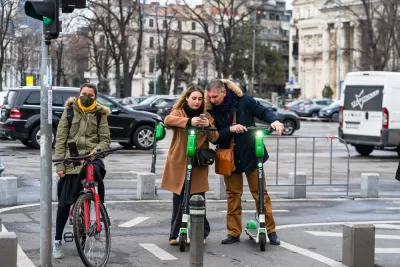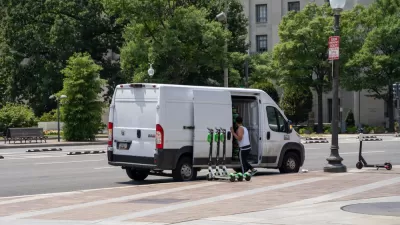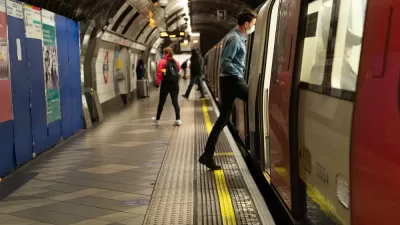It's the end of the scooter as we know it.

Scooter companies cut back on service in the first month of social distancing and stay-at-home-orders, and the industry faces ongoing uncertainty now that as the United States enters a third month of social distancing and stay-at-home orders.
"Lime announced [in March] it will suspend its bike and scooter service in San Francisco, Washington state and some European markets, then doubled down on the suspensions by extending them to all North American markets and 22 countries [in March]," according to an article from March by Jason Plautz.
"Bird told Smart Cities Dive that it had removed its vehicles from San Francisco and select European cities, citing a 'deep understanding of and empathy towards the cities, communities and people we serve.'"
The companies haven't always been in the driver seat in removing scooters from streets—Miami-Dade County, for instance, "barred citizens from operating any common-use micromobility vehicle," according to Plautz. Still, other cities, like San Francisco, made allowances for the vehicles as essential services (San Francisco cut public transit service all over the city in April).
At the outset of the coronavirus public health crisis, shared micromobility devices looked like they might corner a larger share of the urban transportation market as people turned to bike share as they stopped using public transit and other shared modes, and evidence from Wuhan suggested the potential new demand for shared micrombility options after that city ceased its lockdown. As noted by Plautz, the current difficulties for the scooter share market comes at a key time in the industry's businesses cycle—riders tend to return to these systems during the warming months of spring and through the summer.
The reporting in May isn't much more optimistic. While Uber, recently announcing more a wave of layoffs in its ride-hailing business, is selling its JUMP brand to Lime (Lime acquired Jump thanks to investments from Uber, so the sale is still an investment by Uber). Industry observers, like Jared Newman, are already predicting the demise of the electric scooter rental business as we knew it, however briefly.
FULL STORY: Will scooters survive the COVID-19 crisis?

Maui's Vacation Rental Debate Turns Ugly
Verbal attacks, misinformation campaigns and fistfights plague a high-stakes debate to convert thousands of vacation rentals into long-term housing.

Planetizen Federal Action Tracker
A weekly monitor of how Trump’s orders and actions are impacting planners and planning in America.

In Urban Planning, AI Prompting Could be the New Design Thinking
Creativity has long been key to great urban design. What if we see AI as our new creative partner?

King County Supportive Housing Program Offers Hope for Unhoused Residents
The county is taking a ‘Housing First’ approach that prioritizes getting people into housing, then offering wraparound supportive services.

Researchers Use AI to Get Clearer Picture of US Housing
Analysts are using artificial intelligence to supercharge their research by allowing them to comb through data faster. Though these AI tools can be error prone, they save time and housing researchers are optimistic about the future.

Making Shared Micromobility More Inclusive
Cities and shared mobility system operators can do more to include people with disabilities in planning and operations, per a new report.
Urban Design for Planners 1: Software Tools
This six-course series explores essential urban design concepts using open source software and equips planners with the tools they need to participate fully in the urban design process.
Planning for Universal Design
Learn the tools for implementing Universal Design in planning regulations.
planning NEXT
Appalachian Highlands Housing Partners
Gallatin County Department of Planning & Community Development
Mpact (founded as Rail~Volution)
City of Camden Redevelopment Agency
City of Astoria
City of Portland
City of Laramie





























